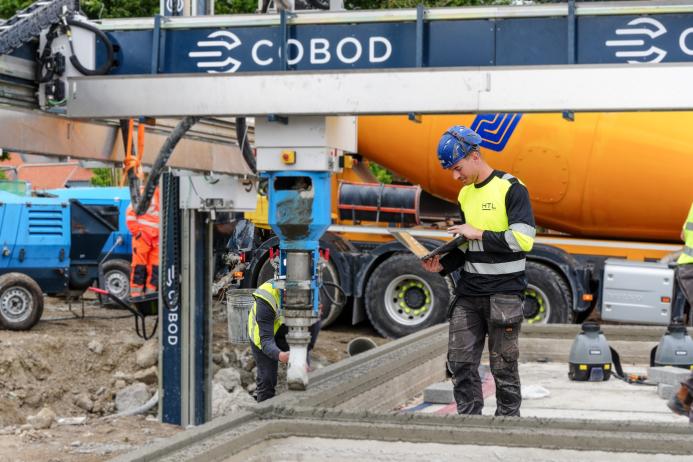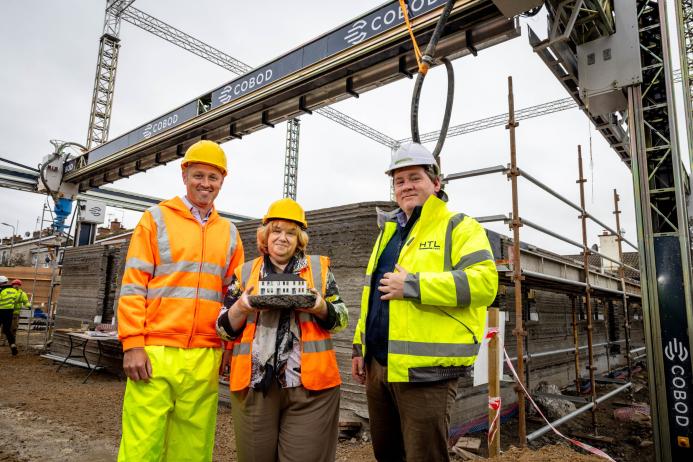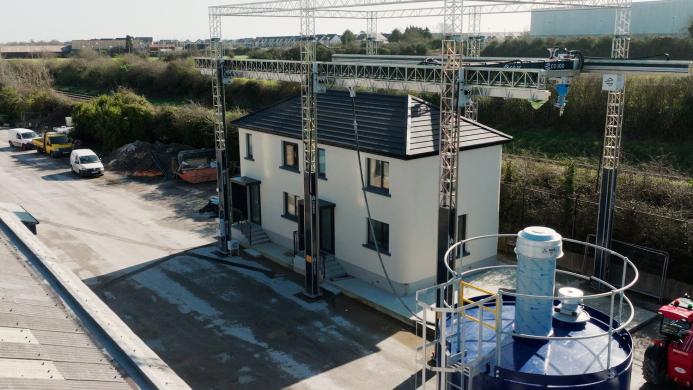First 3D-printed homes for Ireland
Over the past two weeks, a 3D concrete printing machine has been building these homes layer by layer at Grange Close.
"It's like building a concrete block wall, but the machine lays 50mm layers instead of manual placement. As architects and engineers, we design the building digitally, and the model guides the printer to extrude the material layer by layer," explains Justin Kinsella, managing director of Harcourt Technologies Ltd (HTL).
The gantry-mounted 3D concrete printer uses a digital blueprint to extrude concrete, forming cavity walls without need for traditional concrete blocks. HTL claims this method speeds up construction and reduces labour requirements, with the Dundalk homes expected to be completed three times faster than traditional construction methods by October.

Highlighting the system’s efficiency, Kinsella said: "Labour is reduced by about a third, and construction speed is tripled compared to manual methods. Overall, the construction process is 25-30% faster, and we expect further optimisations."
Currently, the 3D printer takes around 18 minutes to lay a 50mm layer of concrete around the three-unit block in Dundalk, with plans to reduce this to 12 minutes. The cost of this method is comparable to traditional construction, but the real benefit lies in the speed of delivery.
Before the Dundalk project, HTL built two test houses at their R&D facility in Drogheda. "We need technology that can do more with fewer resources, and this technology increases housing output with the same resources," states Kinsella.
HTL also emphasises the sustainability of this method, using the "lowest carbon embodied printed concrete globally" with minimal waste due to precise material placement.
Michael McBride, project manager at B&C Contractors, who have been constructing homes for 50 years, welcomes the addition of 3D printing technology. "It's great to incorporate this into housing developments," he says. "The finished product is superior in strength to other methods we're using, so it's likely to become more prevalent."
To prepare for the wider adoption of this technology, the Louth Meath Education and Training Board (LMETB) has acquired its own 3D concrete printer as part of its Advanced Manufacturing Training Centre of Excellence. LMETB collaborates with HTL to provide training at their Drogheda R&D facility, with over 100 people having completed the program.

Sadie Ward McDermott, director of Further Education and Training at LMETB, emphasises the importance of this technology in meeting housing demands and addressing labour market challenges: "In Ireland's strong economy, labour market challenges exist. This technology allows companies to expand despite these challenges," she says. McDermott notes that the technology "augments" rather than replaces traditional construction roles.
"Building a house with a 3D printer doesn't eliminate the need for craftsmen like electricians and plumbers," she explains. "But it significantly increases the speed and scale of construction, crucial for meeting housing needs."
Kinsella agrees, "The technology isn't autonomous; trained personnel are essential. The machines need human support, making LMETB's role critical."
Once completed, the three-bedroom units will provide homes for three families on Louth County Council's social housing list, with the land for the pilot scheme provided by the Local Authority.
Other county councils have shown interest, sending representatives to observe the process on-site.

